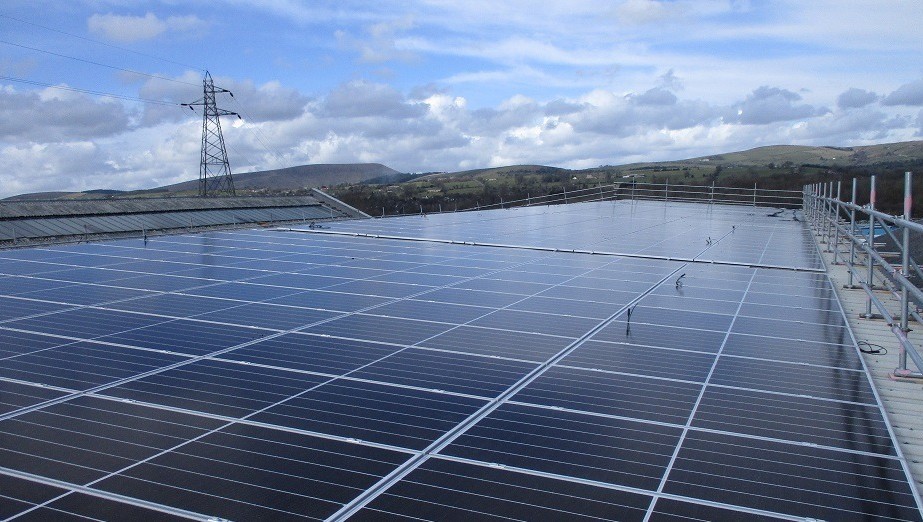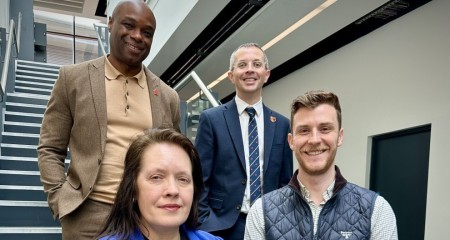
Composite steel reinforced pipe-maker AquaSpira has put the finishing touches to a solar panel installation. It’s the latest step in a carbon saving plan that began with a carbon audit by the University of Central Lancashire’s Making Carbon Work (MaCaW) project, an academic/industry collaboration, part funded by the European Regional Development Fund (ERDF).
With the rising cost of energy, talking to MaCaW has been “one of the best decisions’’ AquaSpira has ever made. Since 2007, Nelson-based AquaSpira has produced innovative drainage solutions for the UK’s housing, utilities and infrastructure sectors. Like many companies, the business has spent the past few years investigating its carbon reduction options.
AquaSpira Managing Director, Neil Wallace, explains: “Across the business we sought initiatives to make our production process more environmentally friendly, in line with our R&D innovations to de-carbonise through pipe design and sensors.
“In order to make the best strategic decisions for the business, we sought a reliable, independent source of information. We needed our investment to generate a return, so it was important to have an independent expert on our side – somebody who understands carbon reduction and the practicalities involved.”
For Neil, that was partly a matter of understanding outputs, carbon savings and return on investment. It was also about sourcing answers to questions such as whether the roof would support a solar installation, how to keep the panels clean and how else the business might cut carbon and costs.
Due to Covid, MaCaW’s audit took place virtually, in April 2021. Calculating the carbon footprint of the business meant examining billing data which, for AquaSpira, comprised electricity, LPG, diesel and waste.
Recommendations included behavioural change, transport improvements, waste recycling initiatives and the installation of solar photovoltaics (PV). “Gathering the information was a bit like sending your accounts to the auditors,” explains Neil.
At the time of the report, the utility cost savings of solar were estimated at around 23%, but recent events have shown that to be a significant underestimate. “Since we had the audit, power prices have gone through the roof. Our figures were based on a 13p kWh price that is less than half the current market prices. Doing this now has become one of the best decisions we've made.”
AquaSpira had recently converted halogen lights to LED to reduce its power costs which MaCaW calculated as an annual carbon saving of 25 tonnes CO2e. “Taken together – the switch to solar, LED and the other changes we’re making – I think we’ll cut our operating carbon emissions by 40-45%,” added Neil.
Going live AquaSpira qualified for an ERDF-funded grant of £15,000 on a solar PV installation with a total cost around £200,000. Installation is now complete and the solar installation will cut AquaSpira’s carbon footprint by 62 tonnes CO2e in addition to the financial saving.
Neil is enthusiastic about the opportunities for business in cutting carbon. He said: “I always come back to finance. Businesses work to the bottom line, so let's talk basics. If you cut your carbon emissions you will cut costs.”
As far as solar is concerned, he sees it as one of the UK’s great missed opportunities. “Look at the solar farms in fields that could be being used for agriculture. Then look at the number of factory roofs that do not have solar panels. We can demonstrate that it just makes sense.”
Neil concludes: “The solar installation, along with the huge strides AquaSpira is making to help developers, the transport and utility industries considerably reduce their impact on the environment through innovative drainage specifications, is not only reducing carbon footprint but also delivering a competitive advantage.
“I can't tell you how incredibly useful MaCaW has been. We've made a £200,000 investment and it was helpful having an advisor and expert to put us on the right track and ensure our investment was well spent.
“Any business considering solar power or similar opportunities should be getting in touch with MaCaW to get the facts. MaCaW was also helpful in assisting AquaSpira in achieving its ISO14001 accreditation.”
To explore how MaCaW could help make your business more efficient while supporting your carbon reduction activities, contact us. MaCaW is a University of Central Lancashire (UCLan) project, an industry and academic collaboration funded by the ERDF alongside UCLan, and supported by Boost; Lancashire’s business growth hub.





The website uses cookies.
Some are used for statistical purposes and others are set up by third party services. By clicking 'Accept all & close', you accept the use of cookies. For more information on how we use and manage cookies, please read our Cookie Policy.